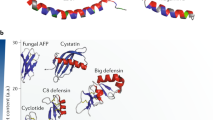Abstract.
An increase in antibiotic resistance and the emergence of new pathogens has led to an urgent need for alternative approaches to infection management. Immunomodulatory molecules that do not target the pathogen directly, but rather selectively enhance and/or alter host defence mechanisms, are attractive candidates for therapeutic development. Natural cationic host defence peptides represent lead molecules that boost innate immune responses and selectively modulate pathogen-induced inflammatory responses. This review discusses recent evidence exploring the mechanisms of cationic host defence peptides as innate immune regulators, their role in the interface of innate and adaptive immunity, and their potential application as beneficial therapeutics in overcoming infectious diseases.
Similar content being viewed by others
Author information
Authors and Affiliations
Corresponding author
Additional information
Received 3 November 2006; received after revision 14 December 2006; accepted 22 January 2007
Rights and permissions
About this article
Cite this article
Mookherjee, N., Hancock, R.E.W. Cationic host defence peptides: Innate immune regulatory peptides as a novel approach for treating infections. Cell. Mol. Life Sci. 64, 922 (2007). https://doi.org/10.1007/s00018-007-6475-6
Published:
DOI: https://doi.org/10.1007/s00018-007-6475-6



